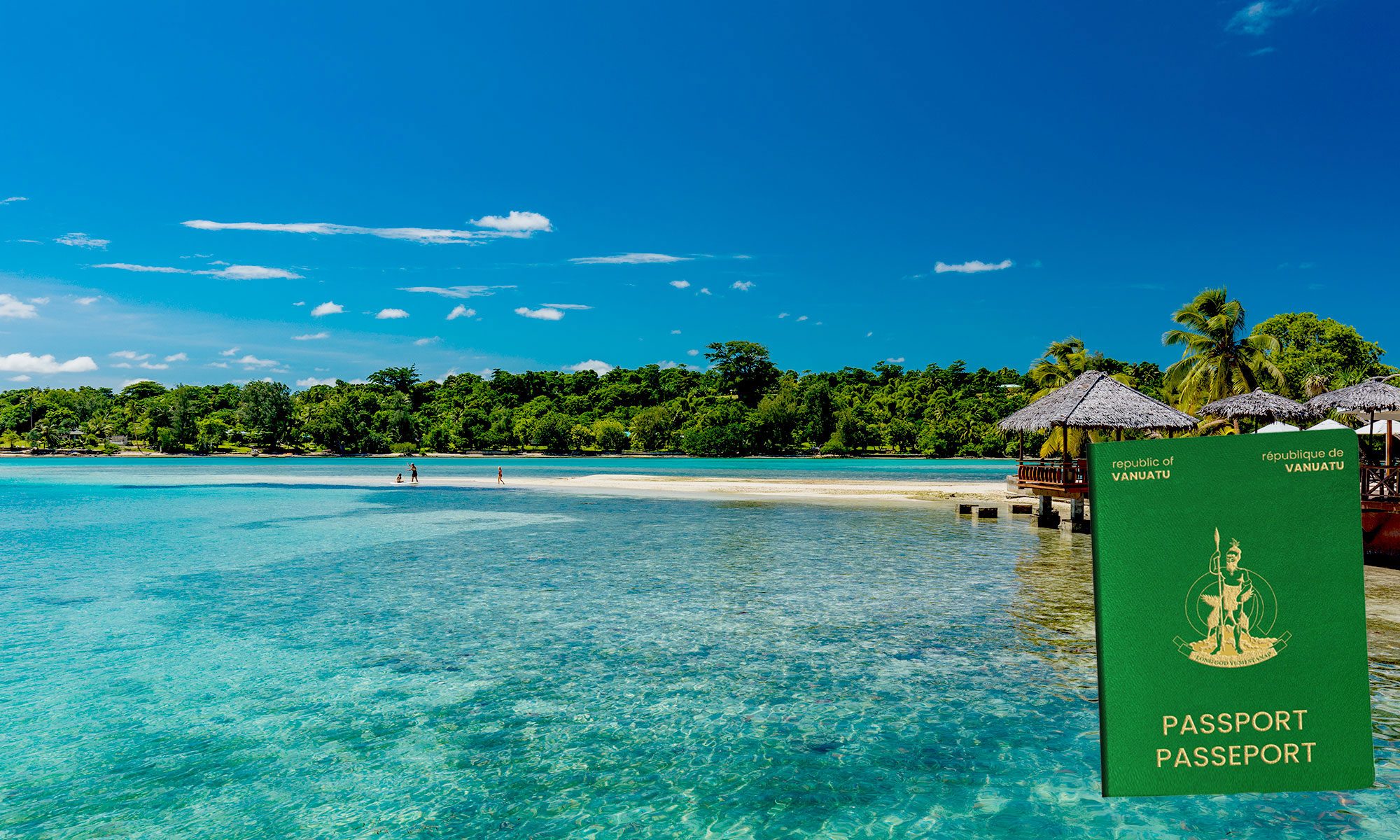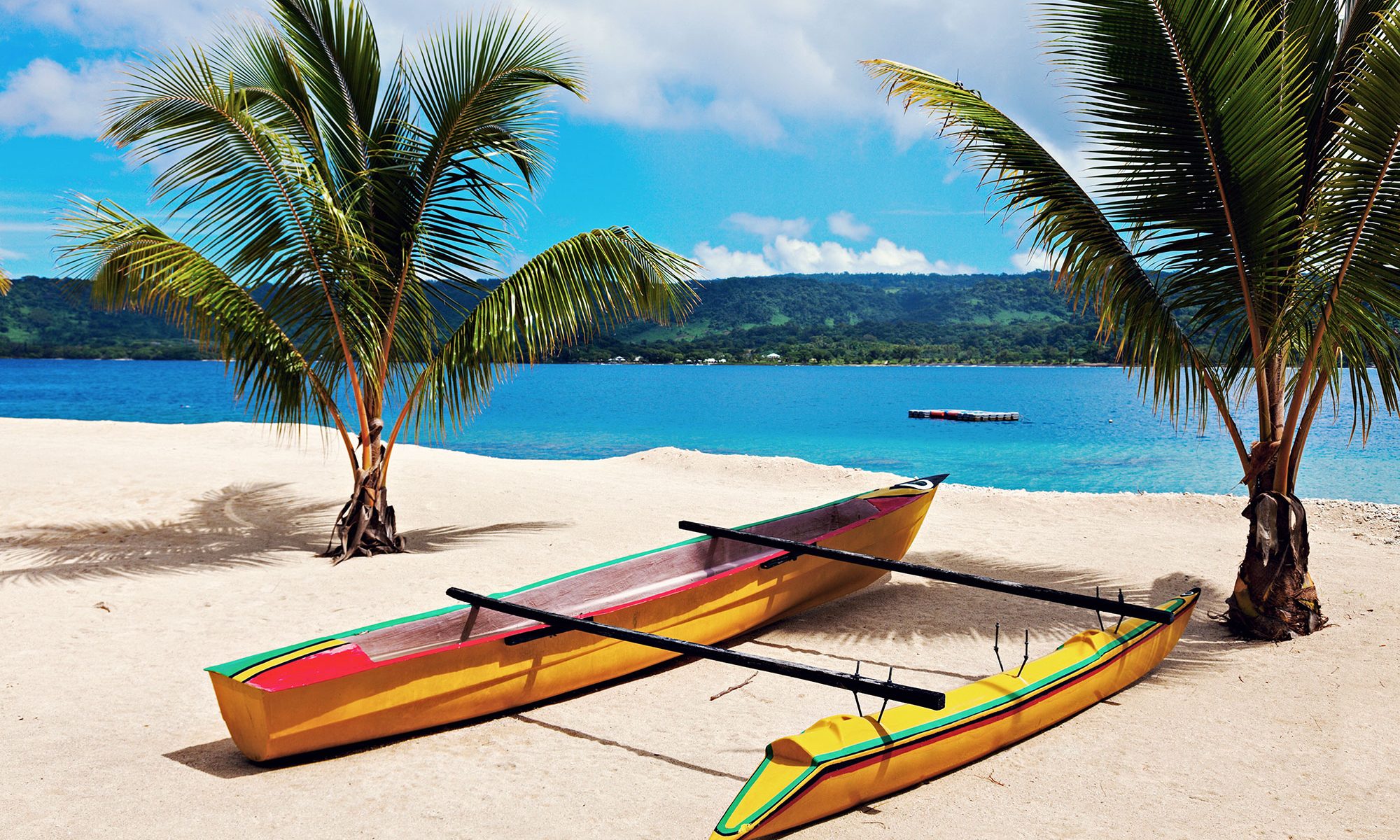Vanuatu General Information
Located in the South Pacific, Vanuatu is often referred to as the Isles of Contrast and the Paradise Islands. With its sub-tropical climate, carefree attitude and an easy going lifestyle, it has been voted the “Happiest Place on Earth” twice in recent years.
The Republic of Vanuatu is especially unique in the Pacific not only because of its indigenous and traditional ethnic diversity. Its colonial heritage which has resulted in a melting pot of diverse origins coming together in a peaceful and relaxed living environment. It is a country where from a tropical environment surrounded by ocean, customs and tradition, one can still access the world at large. Vanuatu has been traditionally politically independent choosing to walk the middle line in global politics based on its conscience more than foreign influences.
The country has a population of around 270,000 and its indigenous inhabitants speak over 170 different languages and dialects making it per capita – the most ethnically diverse country population on the planet.
The peoples’ historical origins are predominantly Melanesian intermixed with Polynesian and also include the famed Lapita People who sailed across the Pacific from Asia almost sixteen hundred years B.C.
The official languages are Bislama which is a type of lingua franca spoken by all as well as English and French. The languages used in the Education system are English and French with state schools teaching the locally developed curriculum and private schools teaching Australian or French curriculum. Most students come out of the country’s Secondary education system being able to speak English and French on top of Bislama and their native indigenous language.
Vanuatu Political System
The political system is a democratic Westminster system of government with a Parliament elected by universal suffrage every 4 years and a President as the Head of State. The executive arm of the State is a democratically elected government headed by a Prime Minister elected by Parliament on that basis of majority rule. The nature of the people is such that despite irregular changes in the country’s dynamic democratic political environment, peaceful transition has always been the norm.
Executive Branch
The constitution created a republican political system headed by a president who has primarily ceremonial powers and is elected by a two-thirds majority in an electoral college consisting of members of Parliament and the presidents of Regional Councils. The president serves a 5-year term. The president may be removed by the electoral college for gross misconduct or incapacity.
The prime minister, who is the head of government, is elected by an absolute majority of the Parliament. In turn he appoints the Council of Ministers, whose number may not exceed a quarter of the number of parliamentary representatives. The prime minister and the Council of Ministers constitute the executive government.
| Office | Name |
|---|---|
| President | Tallis Obed Moses |
| Prime Minister | Bob Loughman Weibur |
| Deputy Prime Minister and Minister of Internal Affairs | Alatoi Ismael Kalsakau |
| Minister of Foreign Affairs and External Trade | Marc Ati |
| Minister of Finance | Johnny Koanapo Rasou |
| Minister of Justice and Social Welfare | Esmon Saimon |
| Minister of Infrastructure and Public Utilities | Jay Ngwele |
| Minister of Tourism, Commerce, Trades and Ni Vanuatu Business | James Bule |
| Minister of Health | Silas Bule Melve |
| Minister of Education | Seoule Simeon |
| Minister of Youth and Sport | Willie Satearoro Pakoa |
| Minister of Planning and Climate Change Adaptation | Lenkon Tao Bruno |
| Minister of Lands, Geology and Natural Resources | Jack Norris Kalmet |
| Minister of Agriculture, Forestry and Fisheries | Willie Daniel Kalo |
Upon the country’s declaration of independence in 1980, it was established that the Attorney General of Vanuatu is the principal legal officer for the government of Vanuatu. The duties, functions, and powers of the Attorney General are outlined in the Republic of Vanuatu’s State Law Office Act [242]. The Attorney General may participate in the meetings and deliberations of the Council of Ministers so as to offer legal advice, but does not have any voting rights nor is designated as a member.
The Solicitor General of Vanuatu supervises and conducts government litigation in court. S/he also provides legal representation in the absence of the Attorney General of Vanuatu. As with the Attorney General, the duties, functions, and powers of the Solicitor General are outlined in the Republic of Vanuatu’s State Law Office Act [242].
| Office | Name |
|---|---|
| Attorney General of Vanuatu | Arnold Kiel Loughman |
| Solicitor General of Vanuatu | Frederick John Gilu |
Legislative Branch
Parliament or Parliament has 52 members, elected for a four-year term in multi-seat constituencies. The president is elected for a five-year term by the parliament. Parliament normally sits for a 4-year term unless dissolved by majority vote of a three-fourths quorum or a directive from the President on the advice of the prime minister. The national Council of Chiefs, called the Malvatu Mauri and elected by district councils of chiefs, advises the government on all matters concerning ni-Vanuatu culture and language.
Judicial Branch
The Supreme Court of Vanuatu is the superior court in Vanuatu. It consists of a chief justice and up to three other judges. Two or more members of this court may constitute a Court of Appeal. Magistrate courts handle most routine legal matters. The legal system is based on British and French law. The constitution also provides for the establishment of village or island courts presided over by chiefs to deal with questions of customary law.
Vanuatu Banking System
The banking hierarchy consists of the Reserve Bank, internationally recognized commercial banks, merchant banks, and an offshore banking sector.
The commercial banks are allowed to conduct business with non-residents and they provide international services through a network of correspondents, consultants and branches.
The domestic banking system involves collaboration between two foreign owned banks and two locally owned banks. The pair of banks from each ownership scheme are supervised by the National Bank of Vanuatu, the Reserve Bank.
Domestically operating banks would be known as local limited companies whereas offshore banks are known as exempted banks and they would use exempted companies.
There are two types of licenses namely: Financial Institution License and Banking License.
Financial Institution License prevents the operation of chequeing accounts, but permits most other banking services.
Banking license includes and obliges the company to use the word bank’ in its name and allows the chequeing activities to be carried out.
Follow this link for further details about Vanuatu banking system.
List of major banks in Vanuatu below:
| Banks in Vanuatu | City |
|---|---|
| ANZ Bank (Vanuatu) Limited | Port Vila |
| Bank South Pacific (Vanuatu) Limited | Port Vila |
| Bred Bank | Port Vila |
| National Bank of Vanuatu | Port Vila |
| Pacific Private Bank | Port Vila |
| Vantu Bank Ltd | Port Vila |
Vanuatu Professional Services
Vanuatu has a very well developed Offshore Finance Center, which has been operating since 1971 with confidentiality provisions, excellent communication systems and experienced professional service providers.
There are no income taxes, withholding taxes, capital gains taxes, gift, death, estate or succession duties applying to companies, trusts or individuals. There are also no tax treaties with other countries however there are now a dozen Tax Information Exchange Agreements with foreign governments. Under the Vanuatu International Companies Act, companies have a 20-year guarantee against taxes, duties and exchange controls.
The Vanuatu Financial Services Commission is responsible for the regulation and supervision of investment business and trust and company service providers. The Commissioner is also the Registrar of Companies, Charitable Organizations, Credit Unions, Trade Unions, Personal Property Securities and Controller of Stamp Duties. The Commission has additional responsibilities including the development of the financial services industry in Vanuatu.
While keen to promote the financial centre facilities, the Commission has an unwavering commitment to ensure that the reputation and integrity of the Centre is maintained. Accordingly, laws have been updated and international standards and best practices have been adopted. A current overhaul of the Finance Centre’s legislative framework which will enhance both the reputation of Vanuatu as an international finance centre and promote investor confidence is being finalized and latest developments include a user friendly system of company registration which can be done entirely Online. More information on the types of commercial structures available and on the registration processes of different commercial structures including international companies and international banks can be obtained from: www.vfsc.vu.
The Vanuatu International Finance Center has been established since 1972 and its members have in-depth financial, investment, banking, accounting and legal expertise. Its members facilitate the formation of international and local companies, the formation of trusts and foundations, and provide full international banking and insurance services as well as provision of access to international investments and share trading in international markets.
In recent years the country has amended its laws to allow for dual citizenship and several types of citizenship classes exist from naturalized citizenship, citizenship by virtue of marriage, citizenship by entitlement, citizenship by investment and the VERP fast-track citizenship.
The Vanuatu Investment Promotion Authority is a one stop shop for interested investors wishing to invest in Vanuatu’s myriad of potential opportunities with Tourism and Agriculture featuring prominently as well as the Finance Centre activities for those who want to take advantage of Vanuatu’s tax haven privileges. More information on potential opportunities can be obtained from: www.investvanuatu.org.
The economy is dominated by Tourism and however there is an agricultural industry and just as important is the country’s Offshore Finance Centre. More information on the nation’s economic and social parameters can be obtained from: www.vnso.gov.vu .
Vanuatu Medical Services
Medical services are available from the State run Health services and expatriate and local foreign trained private medical specialists dispensing such services. There is also ready access to modern medicinal drugs and remedies from commercial chemists.
| Vanuatu State Hospitals | Vanuatu Private Hospitals |
|---|---|
| VILA CENTRAL HOSPITAL | VANUATU PRIVATE HOSPITAL (VPH) |
| NORTHERN PROVINCIAL HOSPITAL | |
| NORSUP HOSPITAL | |
| LOLOWAI HOSPITAL | |
| LENAKEL HOSPITAL |
Vanuatu Telecommunications
Vanuatu has a very well developed international communications system with the development of a submarine cable now connecting Vanuatu to the world global communication network. There are two major domestic telecommunications companies – Vodafone Vanuatu , and Digicel (Vanuatu).
Key developments:
- Vanuatu is benefitting both economically and socially with improved satellite and submarine cable infrastructure telecoms being implemented.
- In 2019/2020 an important telecoms development was occurring for Vanuatu with the launch of the Kacific-1 satellite.
- Mobile date growth is expected to remain strong in Vanuatu in the coming years.
- Telecom Vanuatu Limited (TVL) was acquired by Amalgamated Telecom Holdings as part of its regional expansion.


